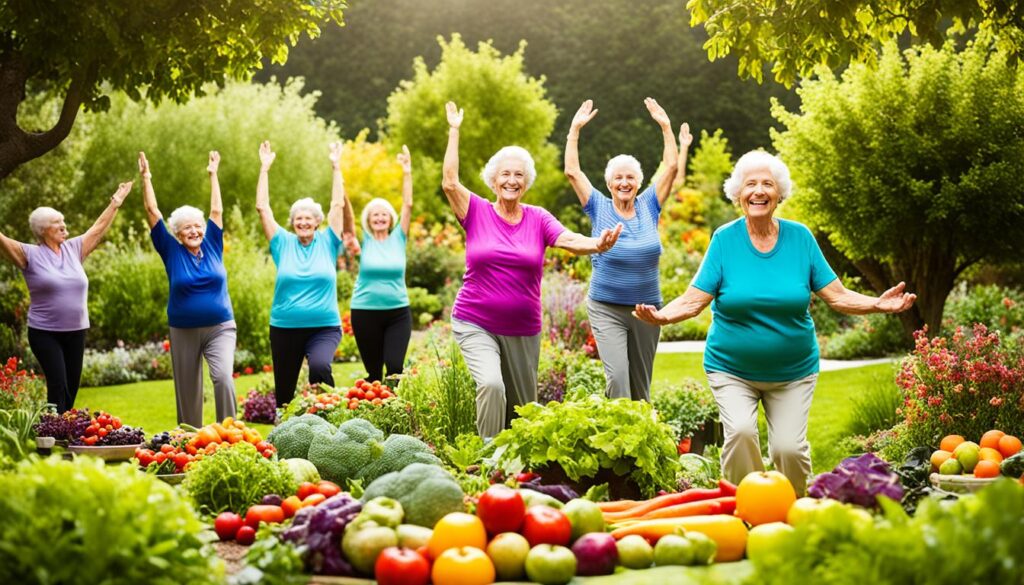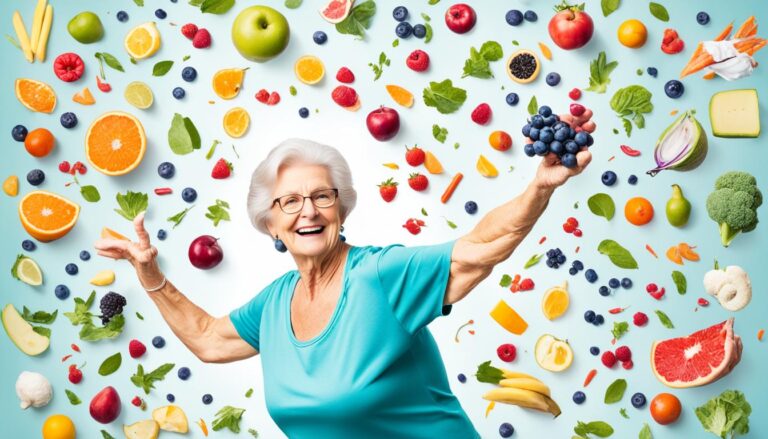Embrace Slow Aging for a Fuller, Healthier Life
Have you ever looked in the mirror and wondered where the time went? I certainly have. As the years have passed, I’ve come to realize the importance of embracing a slow aging approach to life. It’s not about fighting against the inevitable, but rather about embracing the changes that time brings and finding joy in the journey.
When we consciously choose to embrace slow aging, we open ourselves up to a world of transformative benefits. It’s about nurturing our physical, mental, and emotional well-being, and allowing ourselves to age gracefully and with purpose. It’s about living a fuller, healthier life.
Key Takeaways:
- Embracing a slow aging approach allows us to experience sustained health and vitality as we age.
- Slow aging encompasses a holistic approach that includes taking care of our physical, mental, and emotional well-being.
- By adopting healthy habits and focusing on self-care, we can slow down the aging process and reap its many benefits.
- Emotional resilience and positive mindset are key elements of slow aging.
- Social connections and mindful nutrition play significant roles in embracing a slow aging approach.
The Foundations of Slow Aging
Slow aging is a comprehensive approach that goes beyond superficial skincare routines and cosmetic procedures. It is about nurturing our physical, mental, and emotional well-being to unlock the numerous advantages it offers in the aging process. By addressing these foundations, we can experience the anti-aging benefits that contribute to a healthier and more fulfilling life.
The Physical Foundation
Physical health plays a vital role in the slow aging process. Regular exercise, a balanced diet, and proper sleep are key elements to maintain a youthful body and slow down the aging process. Taking care of our bodies from the inside out allows us to enjoy greater vitality and a more youthful appearance.
The Mental Foundation
Mental well-being is another crucial aspect of slow aging. Engaging in activities that stimulate the mind, such as learning new skills, solving puzzles, or practicing meditation, can help preserve cognitive function and reduce the risk of age-related mental decline. Taking care of our mental health is essential for maintaining a vibrant and youthful mind.
The Emotional Foundation
Emotional resilience is a significant factor in slow aging. Cultivating healthy coping mechanisms, nurturing positive relationships, and finding joy in daily activities can contribute to emotional well-being. By embracing our emotions and fostering a positive outlook, we can approach the aging process with grace and optimism.
“Slow aging is about embracing a holistic approach that encompasses every aspect of our well-being. By focusing on the foundations of physical, mental, and emotional health, we can reap the rewards of a more vibrant and fulfilling life as we age.”
Embracing the foundations of slow aging is the key to unlocking the advantages it brings. By prioritizing our physical, mental, and emotional wellness, we can experience the numerous anti-aging benefits and truly embrace a fuller, healthier life.
Longevity Benefits of Slow Aging
When it comes to aging, we all wish to live a longer and healthier life. Slow aging offers the key to achieving this goal by adopting healthy habits and nurturing our overall well-being. By incorporating regular exercise, a nutritious diet, and effective stress management techniques, we can enhance our chances of longevity and embrace the benefits of aging gracefully.
Regular exercise is an essential component of a slow aging lifestyle. It not only helps maintain physical fitness but also promotes cardiovascular health, strengthens bones, and improves cognitive function. Engaging in activities such as brisk walking, swimming, or yoga can have significant positive effects on our overall well-being and contribute to a longer, healthier life.

A nutritious diet plays a crucial role in slow aging and longevity. By consuming a variety of nutrient-dense foods such as fruits, vegetables, whole grains, and lean proteins, we nourish our bodies with vital nutrients that support optimal functioning. A balanced diet rich in antioxidants and essential vitamins and minerals helps protect against age-related diseases and promotes cellular health.
Stress management is another key aspect of slow aging that directly impacts our longevity. Chronic stress has been linked to various health problems and can accelerate the aging process. By incorporating relaxation techniques, such as meditation, deep breathing, or engaging in hobbies we enjoy, we can reduce stress levels and support our overall well-being. Managing stress effectively enhances our chances of a longer, healthier life.
Embracing a slow aging approach allows us to age gracefully, maintaining our vitality as we grow older.
By embracing a slow aging approach, we can experience the longevity benefits that come with aging gracefully. Cultivating healthy habits such as regular exercise, a nutritious diet, and effective stress management not only promotes physical well-being but also supports our mental and emotional health. Aging gracefully means enjoying a fuller, healthier life and remaining vibrant as the years go by.
The Benefits of Slow Aging in Summary:
- Increased chances of living a longer, healthier life.
- Maintaining vitality and energy as we age.
- Enhanced physical fitness and cognitive function.
- Protection against age-related diseases.
- Improved overall well-being and mental health.
- Reduced stress levels and better stress management.
- A fuller, healthier life with a vibrant spirit.
Embracing slow aging is a holistic approach that empowers us to make conscious choices about our physical, mental, and emotional well-being. By adopting healthy habits and nurturing our overall health, we can unlock the key to aging gracefully and enjoying a prolonged, fulfilling life.
Physical Health and Slow Aging
When it comes to embracing a slow aging approach, maintaining good physical health is essential. Taking care of our bodies through regular exercise and a nutritious diet can have significant anti-aging benefits, allowing us to slow down the aging process and feel more energized and youthful.
Exercise plays a crucial role in supporting our physical well-being. Engaging in regular physical activities such as walking, jogging, or dancing helps strengthen our muscles and bones, improve cardiovascular health, and enhance flexibility. By incorporating exercise into our daily routine, we can promote longevity and slow down age-related decline.
A nutritious diet is also vital for slow aging and optimal health. Consuming a balanced diet rich in fruits, vegetables, whole grains, lean proteins, and healthy fats provides our bodies with essential nutrients and antioxidants. These nutrients help combat cellular damage, boost our immune system, and promote healthy skin, giving us a more youthful appearance.
By adopting a lifestyle that prioritizes regular exercise and a nutritious diet, we can protect ourselves against age-related ailments and enjoy the benefits of a slower aging process.
- Regular exercise strengthens muscles and bones, improves cardiovascular health, and enhances flexibility.
- A nutritious diet rich in fruits, vegetables, whole grains, lean proteins, and healthy fats provides essential nutrients and antioxidants.
- Incorporating exercise and a nutritious diet into our daily routine promotes longevity and slows down age-related decline.

Exercise Recommendations:
- Engage in at least 150 minutes of moderate aerobic exercise or 75 minutes of vigorous aerobic exercise every week.
- Incorporate strength training exercises at least two days a week to maintain muscle mass and bone density.
- Include activities that promote balance and flexibility, such as yoga or tai chi, to reduce the risk of falls and improve overall mobility.
By prioritizing physical health through exercise and proper nutrition, we can take active steps towards a healthier and more youthful aging process.
Mental Well-being and Slow Aging
Aging gracefully is not just about maintaining physical health; it also involves nurturing our mental well-being. By incorporating activities that promote mindfulness and cognitive function, we can enhance our overall mental health and maintain mental agility as we age. Adopting a slow aging approach offers numerous benefits for our mental well-being and allows us to enjoy a fulfilling and vibrant life.
One of the key practices that can contribute to mental well-being is meditation. Taking a few minutes each day to sit in silence, focus on our breath, and cultivate mindfulness can have profound effects on our mental state. Meditation helps reduce stress, increase self-awareness, and improve concentration, allowing us to better navigate the challenges that come with aging.
Mindfulness exercises are another effective tool for promoting mental well-being. By bringing our attention to the present moment and fully engaging in our daily activities, we can reduce anxiety and find joy in simple pleasures. Practicing mindfulness while eating, walking, or engaging in other routine activities can help us savor each experience and cultivate a positive mindset.
Engaging in brain exercises is crucial for maintaining cognitive function and reducing the risk of age-related mental decline. By challenging our brains with puzzles, crosswords, or memory games, we can keep our minds sharp and improve our ability to learn new things. Just as physical exercise strengthens our bodies, mental exercises help keep our minds agile.
Embracing a healthy aging lifestyle that includes activities such as meditation, mindfulness, and brain exercises is essential for achieving mental well-being and aging gracefully.
Fostering a positive mindset is also key to mental well-being in the slow aging process. By cultivating gratitude and focusing on the present moment, we can shift our perspective and find joy in every stage of life. Embracing change and seeing aging as an opportunity for growth and new experiences allows us to approach life with enthusiasm and resilience.
A positive mindset not only contributes to our mental well-being but also has a profound impact on our physical health. Research has shown that individuals with a positive outlook on aging tend to experience better overall health and a longer lifespan. By nourishing our minds with positivity and embracing a slow aging approach, we can enhance our well-being on multiple levels.
Incorporating these practices into our daily lives can make a significant difference in our mental well-being. As we age, it’s important to prioritize self-care and engage in activities that nourish our minds. Taking the time to meditate, practice mindfulness, and challenge ourselves mentally can have transformative effects, allowing us to age gracefully and maintain a youthful spirit.
The Benefits of Mental Well-being in Slow Aging
By prioritizing our mental well-being and adopting a slow aging approach, we can experience several benefits:
- Enhanced cognitive function: Engaging in brain exercises and practicing mindfulness can improve memory, concentration, and overall cognitive performance.
- Reduced risk of age-related mental decline: Regular mental stimulation and mindfulness practices can help protect against cognitive decline and conditions such as dementia.
- Improved mental health: By nurturing our mental well-being, we can reduce stress, anxiety, and depression, promoting a positive and balanced state of mind.
- Greater emotional resilience: A positive mindset and the ability to adapt to change can help us navigate life’s challenges with resilience and emotional strength.
- A sense of purpose and fulfillment: Cultivating gratitude and embracing personal growth can bring a sense of purpose and fulfillment, making each day meaningful and enjoyable.

Embracing a slow aging approach that prioritizes mental well-being can lead to a more fulfilling and vibrant life as we age. By adopting practices such as meditation, mindfulness, and brain exercises, we can enhance our cognitive function, reduce the risk of age-related mental decline, and cultivate a positive mindset. Aging gracefully involves nurturing our mental well-being and maintaining mental agility to fully embrace the journey of life.
Emotional Resilience and Slow Aging
Emotional resilience plays a vital role in the process of slow aging. As we navigate the challenges and transitions that come with getting older, developing healthy coping strategies becomes essential for maintaining emotional well-being. By nurturing supportive relationships, engaging in activities that bring us joy and fulfillment, and cultivating a sense of purpose, we can experience the holistic aging benefits of emotional resilience.

Nurturing Supportive Relationships
One of the key elements of emotional resilience is the presence of strong and meaningful connections with others. By fostering supportive relationships with family, friends, and the wider community, we create a network of care and support that can sustain our emotional well-being. These relationships provide opportunities for open communication, shared experiences, and a sense of belonging, which are essential for maintaining a youthful outlook on life.
Finding Joy and Fulfillment
Engaging in activities that bring us joy and fulfillment is another important aspect of emotional resilience. Whether it’s pursuing a hobby, volunteering for a cause we care about, or simply taking time for self-care, these activities enhance our overall sense of well-being. They allow us to tap into our passions, cultivate a positive mindset, and experience the youthful aging benefits of a life filled with purpose and fulfillment.
“Embracing a slow aging approach and nurturing emotional resilience allows us to weather life’s storms with grace and bounce back from adversity.”
Cultivating a Sense of Purpose
A sense of purpose is a driving force behind emotional resilience and slow aging. When we have a clear vision of what matters most to us and actively pursue our goals and passions, we create a sense of direction and meaning in our lives. This sense of purpose fuels our motivation, provides a focus for our actions, and fosters a positive mindset. By cultivating a strong sense of purpose, we can contribute to the holistic aging benefits of emotional well-being and youthful aging.
Emotional resilience is an integral part of the slow aging journey. By nurturing supportive relationships, finding joy and fulfillment, and cultivating a sense of purpose, we can tap into our inner strength and navigate the inevitable ups and downs of life with grace and optimism. Embrace emotional resilience as a cornerstone of your slow aging approach, and experience the transformative power it brings to your overall well-being.
The Role of Self-Care in Slow Aging
When it comes to embracing a slow aging approach, self-care plays a crucial role in maintaining a healthy aging lifestyle and reaping the advantages of the slow aging process. Taking the time to prioritize our well-being, practice stress management techniques, and recharge ourselves is essential for achieving a fuller, healthier life.
Self-care is a holistic practice that encompasses various aspects of our physical, mental, and emotional health. It involves consciously nurturing our mind, body, and spirit, allowing us to find balance and slow down the aging process.
By incorporating self-care into our daily routines, we can create a foundation for healthy aging. This includes practices such as regular exercise, nourishing our bodies with nutritious foods, and getting enough restful sleep. Taking care of our physical health not only helps us maintain our vitality but also contributes to the slow aging process and its advantages.
Quote: “Self-care is not selfish or indulgent. It is really looking after yourself, giving the world the best of you instead of what is left of you.” – Katie Reed
The Benefits of Self-Care for Slow Aging
1. Stress reduction: Incorporating self-care practices such as meditation, deep breathing, or engaging in hobbies we enjoy helps us manage stress levels. Lowering stress is essential for healthy aging and slowing down the aging process.
2. Improved mental well-being: Self-care activities that promote mental well-being, such as journaling, practicing gratitude, or seeking therapy, contribute to cognitive function and emotional resilience. By taking care of our mental health, we can age gracefully and maintain a positive mindset.
3. Enhanced emotional well-being: Prioritizing self-care allows us to nurture our emotional health. Engaging in activities that bring joy, setting boundaries, and developing healthy coping mechanisms contribute to emotional resilience and overall well-being.
4. Increased self-awareness: Practicing self-care fosters self-reflection and self-awareness, allowing us to identify our needs and set healthy boundaries. By understanding ourselves better, we can make choices that support our well-being and slow down the aging process.
5. Boosted self-esteem: Engaging in self-care activities, such as self-compassion exercises or practicing self-acceptance, promotes a positive self-image and boosts self-esteem. Building a healthy relationship with ourselves is essential for embracing a slow aging approach.
By prioritizing self-care in our lives, we can experience the many benefits it brings to our overall well-being and embrace a slow aging lifestyle.

Social Connections and Slow Aging
Social connections play a vital role in the process of slow aging. Research has shown that cultivating strong relationships and a sense of belonging can have profound effects on our overall well-being and longevity. By fostering meaningful connections and actively participating in social activities, we can age gracefully and maintain a youthful spirit throughout our lives.
“Connection is the energy that is created between people when they feel seen, heard, and valued.”
When we engage in social interactions, we experience a sense of community and support that contributes to our overall well-being. Meaningful connections with family, friends, and community members provide us with emotional support, reduce stress levels, and may even boost our immune system.
By surrounding ourselves with positive and like-minded individuals, we create an environment that cultivates joy, laughter, and shared experiences. These interactions stimulate our minds, promote happiness, and contribute to a more youthful outlook on life.
The Benefits of Social Connections for Aging Gracefully:
- Enhanced emotional well-being and mental health
- Reduced risk of depression and loneliness
- Lowered stress levels
- Increased cognitive function and mental agility
- Improved self-esteem and self-worth
- Boosted immune system
- Longer lifespan
Being socially connected allows us to share our life experiences, seek advice, and learn from others. It provides us with a sense of purpose and allows us to contribute to the well-being of those around us. Whether it’s participating in group activities, volunteering, or simply spending quality time with loved ones, fostering strong social connections is a cornerstone of slow aging.

Let’s cherish the power of social connections and embrace the benefits they bring to our journey of aging gracefully. As we surround ourselves with positive and supportive individuals, we create a vibrant and fulfilling life that inspires and uplifts us.
Slow Aging and Mindful Nutrition
Mindful nutrition is an integral part of a healthy aging lifestyle. It involves nourishing our bodies with nutrient-dense foods and making conscious choices to promote long-term well-being. By adopting a slow aging approach to nutrition, we can unlock a range of anti-aging benefits and support our overall health and vitality.
When it comes to slow aging and nutrition, it’s essential to prioritize the quality of the foods we consume. Opting for nutrient-dense options such as fruits, vegetables, whole grains, lean proteins, and healthy fats provides our bodies with the vitamins, minerals, and antioxidants they need to thrive. These foods fuel our cells, support our immune system, and help combat the effects of aging.
One key aspect of mindful nutrition in slow aging is avoiding harmful substances that can accelerate the aging process. This includes minimizing the intake of processed foods, sugars, saturated fats, and artificial additives. By cutting back on these harmful substances, we can reduce inflammation in our bodies and protect against age-related illnesses.
Embracing a slow aging approach to nutrition also means adopting mindful eating habits and practices. This involves paying attention to our body’s hunger and fullness cues, savoring each bite, and eating slowly and mindfully. By eating with awareness and presence, we can better enjoy our meals, improve digestion, and promote a healthier relationship with food.
Additionally, incorporating intermittent fasting or time-restricted eating into our routine can offer further benefits for slow aging. These practices involve restricting the window of time during which we consume food. This allows our bodies to enter a state of autophagy, where old and damaged cells are cleared out, promoting cellular rejuvenation and anti-aging effects.
The Benefits of Mindful Nutrition in Slow Aging:
- Enhanced Nutritional Intake: By prioritizing nutrient-dense foods, we provide our bodies with essential vitamins, minerals, and antioxidants necessary for optimal health and vitality.
- Reduced Inflammation: Avoiding harmful substances such as processed foods and sugars can help minimize inflammation, a key factor in age-related diseases.
- Improved Digestion: Mindful eating practices, such as eating slowly and paying attention to hunger and fullness cues, can enhance digestion and nutrient absorption.
- Promotes Weight Management: Mindful nutrition can support healthy weight management, preventing excessive weight gain and reducing the risk of obesity-related conditions.
- Cellular Rejuvenation: Incorporating intermittent fasting or time-restricted eating activates autophagy, a process that promotes cellular rejuvenation and anti-aging effects.
By combining a slow aging approach to nutrition with other aspects of the healthy aging lifestyle, we can optimize our well-being and unlock the full potential of aging gracefully. Mindful nutrition empowers us to nourish our bodies and support healthy aging from within.

Embracing Change and Growth in Slow Aging
Slow aging is not just about maintaining physical health; it’s also about embracing change and fostering personal growth throughout our lives. By staying open to new experiences, learning new skills, and challenging ourselves, we can continually evolve and maintain a youthful mindset. Embracing growth is an essential part of the slow aging process.
The Power of Embracing Change
Change is a natural part of life, and embracing it allows us to adapt, learn, and grow. When we resist change, we miss out on valuable opportunities for personal development and progress. By embracing change and viewing it as a chance for growth, we can navigate life’s transitions with resilience and optimism.
As we embrace change, we can discover new passions, hobbies, and interests that contribute to our overall well-being. Trying new things keeps our minds sharp and engaged, and it can lead to unexpected joy and fulfillment. By stepping out of our comfort zones, we can break free from stagnation and embrace a more vibrant, dynamic life.
The Benefits of Continuous Learning
Learning is a lifelong journey, and it plays a crucial role in slow aging. By challenging ourselves to acquire new knowledge and skills, we stimulate our brains and enhance cognitive function. Continuous learning keeps our minds sharp, improves memory, and can even reduce the risk of age-related cognitive decline.
Whether it’s learning a new language, mastering a musical instrument, or acquiring new professional skills, engaging in lifelong learning contributes to a sense of purpose and personal growth. It keeps us curious, motivated, and adaptable, essential qualities for embracing the slow aging process.
Quotes About Embracing Change and Growth
“The only way to make sense of change and grow together is to plunge into it, move with it, and join the dance.” – Alan W. Watts
“The only limit to our realization of tomorrow will be our doubts of today. Let us move forward with strong and active faith.” – Franklin D. Roosevelt
Embracing Change and Growth in Slow Aging
| Benefits of Embracing Change and Growth in Slow Aging |
|---|
| 1. Reinforces a youthful mindset |
| 2. Stimulates personal development |
| 3. Enhances cognitive function |
| 4. Cultivates curiosity and adaptability |
| 5. Contributes to a sense of purpose |
| 6. Keeps the mind sharp and engaged |
Embracing change and growth in slow aging not only benefits our personal development but also enhances our overall well-being. By embracing the transformative power of change and actively seeking personal growth opportunities, we can lead more fulfilling and joyful lives as we age.
Cultivating a Positive Mindset in Slow Aging
Aging gracefully brings a multitude of benefits, both for our physical well-being and our overall quality of life. One essential aspect of embracing slow aging is cultivating a positive mindset. By adopting positive attitudes and habits, we can enhance our overall well-being, experience increased longevity, and enjoy a more fulfilling and joyful life as we age.
Gratitude: Practicing gratitude is a powerful way to shift our focus from what may be challenging about aging to what we appreciate and cherish in life. By acknowledging and expressing gratitude for the blessings and experiences we have, we can cultivate a positive outlook that promotes emotional well-being and satisfaction.
Mindfulness: Developing mindfulness allows us to be fully present in each moment and embrace the beauty that surrounds us. It involves paying attention to our thoughts, feelings, and sensations without judgment, fostering a sense of peace and contentment. Mindfulness promotes resilience, reduces stress, and enhances our ability to navigate the aging process with acceptance and grace.
Reframing negative thoughts: As we age, it’s common to encounter negative thoughts or beliefs about our abilities or appearance. By consciously reframing these negative thoughts into positive and empowering ones, we can challenge self-limiting beliefs and cultivate a healthier self-image. Reframing negative thoughts helps us see the value and wisdom that comes with age, allowing us to approach each day with confidence and self-acceptance.
“A positive mindset is not only important for our mental and emotional well-being, but it also has a direct impact on our physical health and longevity. By cultivating gratitude, practicing mindfulness, and reframing negative thoughts, we can embrace the aging process with optimism and resilience, experiencing the many benefits that come with aging gracefully.”
Cultivating a positive mindset is a lifelong journey that requires intention and practice. By incorporating gratitude, mindfulness, and reframing techniques into our daily lives, we can nurture a positive outlook that extends far beyond the surface-level effects of aging. A positive mindset enhances our overall well-being, contributes to our longevity, and allows us to savor the journey of aging with grace and vitality.
Conclusion
In conclusion, embracing a slow aging approach to life offers a multitude of transformative benefits. By prioritizing our physical, mental, and emotional health, fostering social connections, and adopting mindful practices, we can experience sustained health, vitality, and a fuller, healthier life.
By taking care of our bodies through regular exercise and a nutritious diet, we can slow down the aging process and protect ourselves against age-related ailments. Simultaneously, nurturing our mental well-being through activities like meditation and brain exercises enhances cognitive function and reduces the risk of mental decline.
Embracing a slow aging approach also encourages us to develop emotional resilience and cultivate a positive mindset. This allows us to navigate life’s challenges with grace, maintaining a sense of purpose and enjoying a youthful outlook in the process. Moreover, fostering meaningful social connections provides us with a sense of belonging and support, contributing to our overall well-being and longevity.
Incorporating mindful nutrition and self-care into our daily routines further promotes a healthy aging lifestyle, nourishing our bodies and minds. By embracing change and personal growth throughout our lives, we can continually evolve and maintain a youthful spirit, unlocking the potential for joyful and graceful aging.
FAQ
What is slow aging?
Slow aging is a holistic approach to aging that focuses on taking care of our physical, mental, and emotional well-being to experience sustained health and vitality as we grow older.
What are the benefits of embracing a slow aging approach to life?
Embracing a slow aging approach offers numerous benefits, including increased longevity, a healthier physical body, improved mental well-being, emotional resilience, enhanced self-care, stronger social connections, mindful nutrition, personal growth, and a positive mindset.
How can slow aging contribute to longevity?
By adopting healthy habits such as regular exercise, a nutritious diet, and stress management techniques, slow aging can enhance our chances of living a longer, healthier life.
How does slow aging promote physical health?
Slow aging emphasizes regular exercise and a nutritious diet as essential components to maintain good physical health, slow down the aging process, and protect against age-related ailments.
What are the mental well-being benefits of embracing a slow aging approach?
Incorporating activities such as meditation, mindfulness, and brain exercises into our daily lives can enhance cognitive function, reduce the risk of age-related mental decline, and promote a positive mindset.
How does slow aging contribute to emotional resilience?
Slow aging encourages the development of healthy coping strategies, nurturing relationships, and engaging in activities that bring joy and fulfillment, promoting emotional well-being and a youthful outlook on life.
Why is self-care important in the slow aging process?
Practicing self-care, including stress management and prioritizing well-being, allows us to recharge, find balance, and slow down the aging process, reaping its many benefits.
How do social connections contribute to slow aging?
Strong relationships and a sense of belonging support overall well-being and longevity. Fostering meaningful connections and engaging in social activities promotes graceful aging and maintains a youthful spirit.
What role does mindful nutrition play in slow aging?
Mindful nutrition, nourishing our bodies with nutrient-dense foods and avoiding harmful substances, supports our overall health and vitality, contributing to long-term well-being.
How can embracing change and growth enhance the slow aging process?
Embracing change, learning new skills, and challenging ourselves throughout our lives contribute to personal growth and maintaining a youthful mindset, an integral part of the slow aging process.
How does cultivating a positive mindset benefit slow aging?
Cultivating gratitude, practicing mindfulness, and reframing negative thoughts enhance our overall well-being and contribute to a fulfilling and joyful life as we age.







